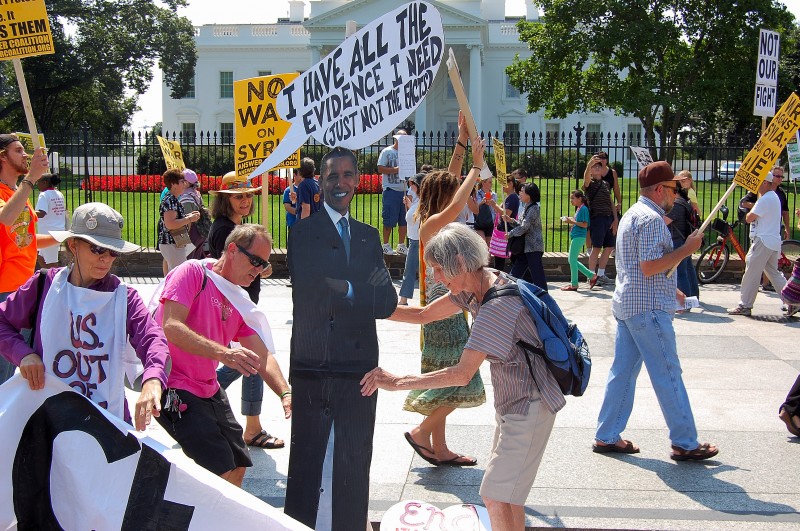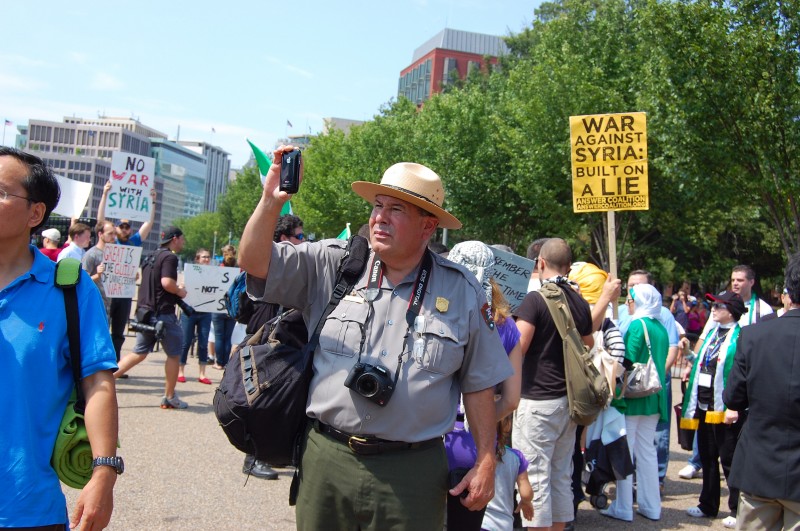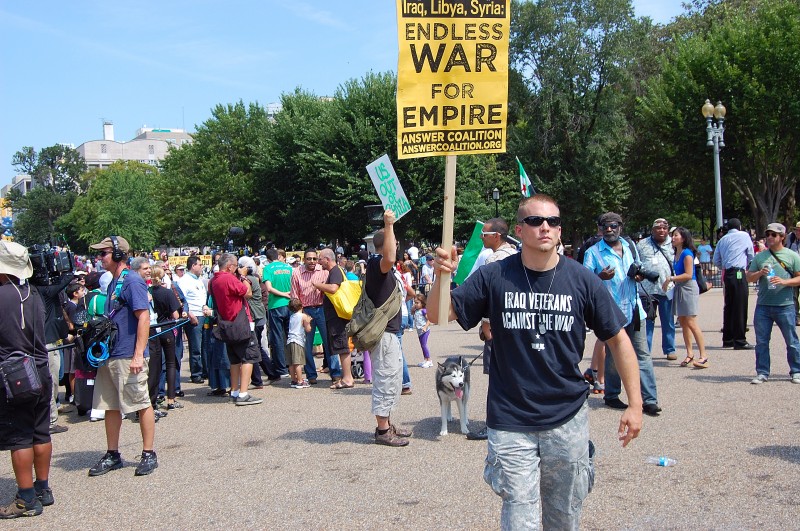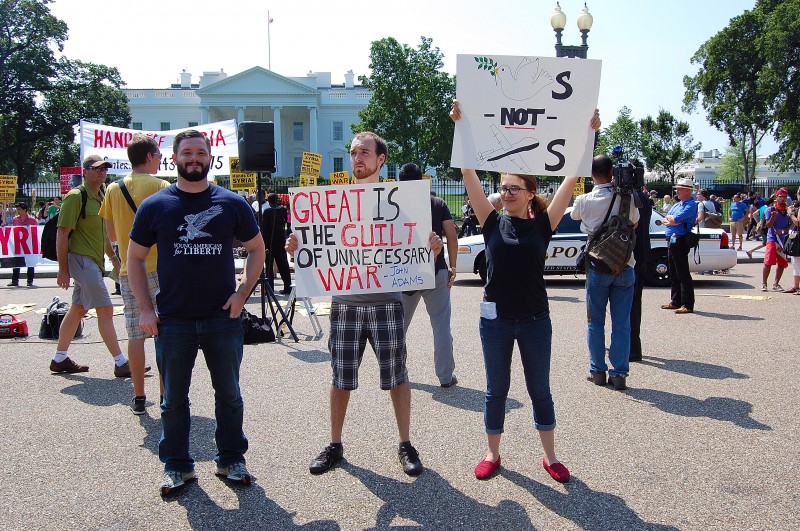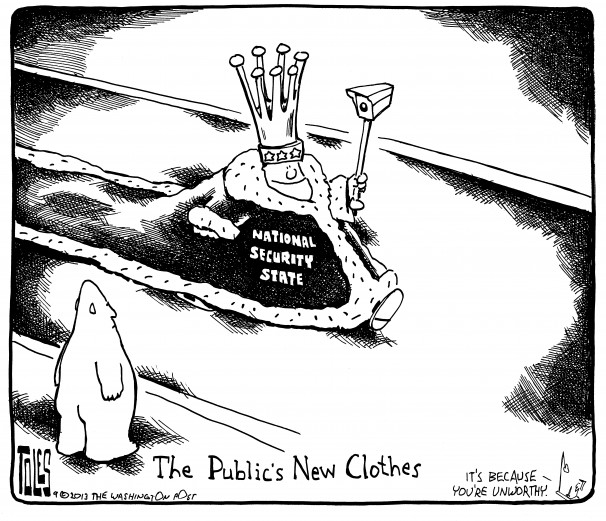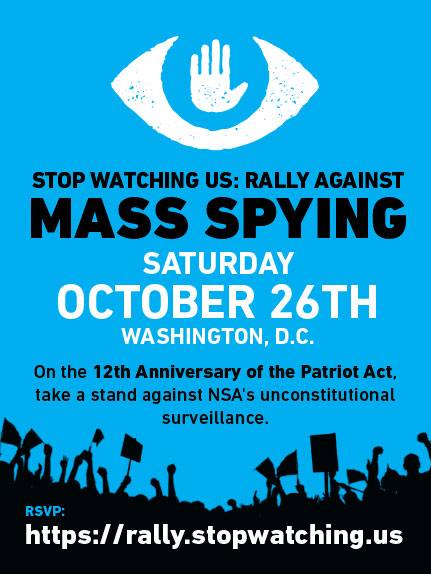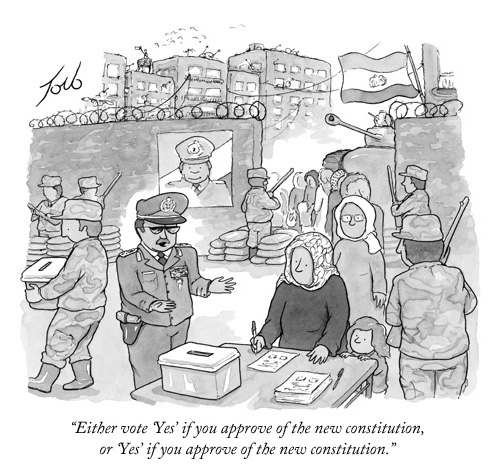![ffflogo]() Here is the transcript from my speech on ”How Foreign Warring Subverts Freedom at Home” from the June 2007 The Future of Freedom Foundation conference on Restoring the Republic. This has lots of remarks about the NSA scandal, torture, the suspension of habeas corpus, and other cheerful topics. There were some excellent questions after the speech from folks like Bill Anderson and John Walsh.
Here is the transcript from my speech on ”How Foreign Warring Subverts Freedom at Home” from the June 2007 The Future of Freedom Foundation conference on Restoring the Republic. This has lots of remarks about the NSA scandal, torture, the suspension of habeas corpus, and other cheerful topics. There were some excellent questions after the speech from folks like Bill Anderson and John Walsh.
One lady asked for suggestions on responding to a problem with her local government. I assured her: ”The first rule is to never take legal advice from a freelance writer.”
Here’s the text from the June 1, 2007 speech (first moments of the speech was not captured by the audio or transcript):
Jim Bovard: … and to help keep the Future of Freedom Foundation going forward, and it’s great to talk to an audience as sophisticated and as well informed as this because , that’s not normally the situation in Washington. And I want to thank Bumper for his kind words. I really enjoyed working with FFF over the years, and Bumper has helped protect me against my moderate tendencies. , because there are a number of times where I’m thinking , maybe Bush has got a point, ? But then I talk to Bumper and I say yeah, well, maybe he is a rascal.
When I was sitting down a couple of days ago preparing this speech, I realized I had a simple choice. The first choice would be to take the high road, and the second choice would be to talk about the TSA [Transportation Security Administration]. I’m curious, did anybody here have a bad experience flying in? Okay, well bad news. The feds have got this under surveillance, you’re going to have a hell of a lot worse time getting home. Now, there was an article by the Heritage Foundation, a conservative think tank, and Heritage was saying that the only change as far as civil liberties since 9/11 is that people have to take off their shoes when they go to the airport. Well, I don’t know what kind of shoes that guy wears, but the fact is that, thanks to 9/11 and thanks to the federal failure, the failure by the Federal Aviation Administration, the FBI, the CIA, the National Security Agency, thanks to their failure to stop the hijackers, we now have an army of occupation of 45,000 federal agents at these airports.
And the feds seem to change the rules each month as far as what you can and cannot do when you’re traveling within the U.S. Toothpaste has come in for a lot of grief lately. , if it’s a large tube then, , you’re a suspected terrorist. The rules on shoes, some months you have to take off your shoes, some not. I guess one bright side of that is it’s made it a lot easier for TSA to hire new agents because there are a lot of shoe perverts out there who are all like oh, here’s some nice ones, you’ve got to check your shoes and make sure they’re dry when they come through those things there.
And TSA is always making up new rules. TSA is pulling one rabbit out of a hat after another. Back in August, September 2003 there was a bombing. Some Chechnyan terrorists apparently blew up a Russian airplane, and there wasn’t really good evidence as far as how the terrorists blew it up. But the TSA assumed that the terrorists were female and that they’d hidden a bomb in their brassiere. So TSA proceeds to treat every ample female in the country traveling as if she was carrying breast bombs. And, there was just a huge scandal. It was something that was kind of started overnight. There was no warning, there was no public discussion. There was no one to tell the TSA, hey, you boneheads are out of your minds.
It didn’t matter, because the TSA had the authority. The TSA makes the rules, it enforces them and it judges all the violators. And this is exactly the type of paradigm that James Madison warned against as the epitome of tyranny. Something that the TSA has started to do a couple of years ago is impose attitude fines of up to $1,500. SA did not announce this either, but if someone is going through the TSA line, it doesn’t matter if they have been delayed for half an hour and missed their flight, or if some TSA person is giving them grief and the person talks back to them, the TSA can fine you up to $1,500. And often, a person has no notice of this until they get a letter in the mail a few weeks or a month or two later.
I assume this is a program to make the government safe from sarcasm. But this is the type of thing that has multiplied since 9/11. You have people making up rules, not telling Americans about them and simply trying to make Americans grovel at the feet of federal agents. And there has been a consistent message from parts of Washington and parts of Congress and the Bush Administration that groveling will make us safe. But it hasn’t worked for people in the past in other countries and it won’t work for Americans now.
Something which is really striking to me about how the war on terror has changed America, it has brought out the latent authoritarianism in this country – more so than even I expected. If you think back a few years ago to how the Dixie Chicks were vilified for just a casual comment that their lead singer made in a concert in England. If you look at how many conservatives have been calling for the New York Times to be prosecuted for treason simply because the New York Times has had some stories about federal lawbreaking. If you look at some of their prominent conservative columnists who are calling for the creation of concentration camps in this country for Muslims or Arabs. And, one person who did this is a best-selling author. These are things that would have been very difficult to imagine, even a few years ago, and to see where the tread lines are going in this country, it’s very, very concerning.
But a lot of the news media tell us that the war on terror is not a threat to you unless you’re a terrorist, or unless you’re a terrorist suspect. And that second category, it kind of blossoms. Looking back to what the feds did after 9/11, the feds have rounded up more than 1,200 people and locked them up and in many cases violated their rights, held them in violation of court orders, and the only thing a person needed to do to be considered a suspected terrorist was to be a Muslim or an Arab who was an illegal immigrant who was encountered by FBI agents in New York or New Jersey. That was what it meant to be a suspected terrorist. Arab students were locked up as suspected terrorists for working at a pizza parlor in violation of their student visa. A Pakistani immigrant was jailed as a suspected terrorist because his neighbors called him in because he failed to cut the grass and he hung his underwear out on the fence. That was pretty suspicious.
There were some FBI agents, the FBI was under a lot of pressure to bring in people for questioning. Some FBI agents were told to look in phone books to find the names of Arabs and Muslims who could be interrogated. These are the standards the government was using after 9/11. Now, it’s gotten worse since then in some ways. The Homeland Security Department in May 2003 urged local police departments to view critics of the war on terror as potential terrorists. The feds told local lawmen to be on alert for potential suicide bombers, and the feds said that the suicide bombers could be recognized by things such as having a pale face from a recent shaving of a beard. Or for instance, a person might appear to be in a trance or their eyes might appear to be vigilant and focused.
And the feds warned the suicide bombers might be someone whose clothing is out of sync with the weather. I’ve heard that from quite a few people who flew in here and didn’t realize that it’s summer here in D.C. The feds also warned that if someone’s clothing is loose that that could be a sign of a suicide bomber. I don’t know how many college campuses these folks have visited recently, but , and perhaps to ensure that there will never be a shortage of terrorists, the feds warned that another telltale warning sign is that someone for whom waiting in a grocery store line becomes intolerable. And these are the experts at Homeland Security. This is what they’re telling eighteen thousand federal, local, and state law enforcement agencies around the country. And this is some of the stuff that’s leaked out. It’s possible there’s much more comical stuff we haven’t heard about yet. But this is what these folks are getting away with.
It’s interesting to see some of the other definitions that federal agencies have used here. The Pentagon is doing a lot of surveillance inside the U.S. now. This is in violation of federal law. They’ve been caught breaking the law a number of times, and each time they have explained well it wasn’t intentional. And that satisfies Congress. And it wasn’t a concern for the Bush Administration because they haven’t been impeded by the law for a long time. But for instance, the Pentagon has got a counterintelligence field activity program that’s out there covertly gathering information on Americans who protest against the Iraq War or who are involved with Web sites that are critical of U.S. military policy. I was talking to Don Rumsfeld about this last week and he said that FFF is not on the list. So , people don’t need to worry about that. But the Pentagon has carried out scores of surveillance of a lot of antiwar protests and gatherings, including one at a Quaker meeting house in Florida. Names of people who go to these kinds of things are added to a Pentagon database which involves terrorism threat warnings. And this is something which would be on your permanent federal record.
And folks might have this notion that well, but there’s due process, so this information would not be used against me. It’s fine to have a healthy fantasy life, but these are not the rules that the government plays by. And the federal law is less and less of an impediment to the Bush Administration every year. Something we learned in late 2005 was that the National Security Agency had conducted thousands of warrantless wiretaps on Americans. This is something that the New York Times was told about a month or two before the 2004 election, but they chose not to publish it and therefore the New York Times may have gotten Bush a second term because they were basically cowardly on this.
But, during the 1970s, there were horrendous abuses of the federal government doing wiretaps on Americans for supposedly national security reasons. There were White House aides, I think Bill Safire was wiretapped, Henry Kissinger had him tapped, and there were no limits on this. It was simply up to the president to decide who would be tapped. Congress recognized that there were horrendous abuses there. There was a law passed in 1978 called the Foreign Intelligence Surveillance Act, which makes it a crime to do a wiretap without a warrant. It can be a warrant from a secret court, this FISA court, which is pretty much of a joke, because it simply rubberstamps almost everything the government asks for. But there is at least some record there. But the Bush Administration decided that even seeking a warrant was a violation of his dignity, and that the president had his own inherent authority to order wiretaps of Americans’ phone calls.
This is the very clear doctrine that Bush lawyers have established. It’s something that Alberto Gonzales referred to as the Commander in Chief Override. So basically you have the entire U.S. Constitution, well, that’s a technicality because George Bush has to protect America. And that has been their attitude on many areas. And the type of wiretaps that they’re doing, we don’t know who they’re wiretapping. And Congress has not shown a lot of curiosity. But these are the type of scandals which tend to snowball. Things are probably a hell of a lot worse than what they seem, because that has been the type of pattern for every type of Bush violation of law so far.
Something which came out last May, was that the feds have been doing call tracking for millions of Americans. The feds have been tracking every number which a person would call or be called by, creating these massive data warehouses. This is completely illegal under a 1986 federal law. But the feds have just kind of shrugged that off and they haven’t worried about that. Now, it’s interesting what their rule of law has become, because there were a lot of concerns in the Justice Department about whether these secret wiretaps were illegal. But during the time Ashcroft was Attorney General, it basically got rubberstamped every time and the Bush Administration’s attitude was that the Justice Department said it was legal. There was no need to go to a court. It was self-evident that it was legal.
There was a glitch one time because the program was expiring and Ashcroft was in the hospital after having some kind of, was it gall bladder problem? Something like that. And he wasn’t really that conscious. But it was necessary for him to certify that the program was in compliance with the law, or else it would look like Bush and his team were breaking the law. So you had Andrew Card, the White House Chief of Staff, and Gonzales raced over to Ashcroft’s hospital room to pressure him to sign this waiver of federal law to let them keep on wiretapping. Well, as a former Deputy Attorney General Comey testified a few weeks ago, he heard that they were on the way and he raced there to Ashcroft’s hospital bed. It had to be a hell of a scene because John Ashcroft didn’t make much sense when he was sober. And to think of John Ashcroft kind of zoned out on painkillers, and then to have the White House Chief of Staff and Gonzales, who I’ve always had a lot of respect for his scholarship on the law, to have those guys by Ashcroft’s hospital bed and Comey there is arguing and [word missing] apparently came and so they were not able to get this certified as being legal.
But Bush said well, on a temporary basis just keep doing it on my authority. People were concerned about this in the Justice Department, and an investigation was launched early last year on this. But George Bush scuttled the investigation. It was looking at whether Gonzales, as White House Counsel, and Bush, primarily Gonzales but with Bush’s approval, whether they had violated federal law with this warrantless wiretapping. But George Bush effectively scuttled that investigation. Now this was in the papers briefly. If you think back to the early 1970s, Nixon did some similar things and people got really upset. But for some reason, this has rolled off people’s backs like water of a duck’s back. The news media have chosen to make very little hubbub over this. But it looks like a very clear case of a president basically scuttling an investigation into his own criminality. At some point, there’s got to be a conflict of interest there. Now, the thing with the wiretaps, this is something which plays into a lot of the other stuff the Bush Administration is doing. There was a provision in the Patriot Act which greatly expanded the FBI’s authority to use national security letters. And a national security letter is simply an FBI subpoena but it has the force of law. Not only that, but it’s the legal equivalent of an FBI going in there and holding a sword over somebody’s head because someone who receives one of these national security letters is prohibited from telling anybody. They were even prohibited from telling their lawyer up until very recently. And the Bush team said well, this is not really a problem because these are things which were being used very rarely.
Well, they lied. It turns out the FBI was issuing at least 30,000 national security letters a year. And these are 30,000 warrantless searches. These are under supervision of no judge. It’s simply some FBI office asked and said well, should we search this guy’s records and they say yeah, okay, fine. That’s due process with these national security letters. And as the Washington Post noted, these letters empower the FBI to seize records that show where a person makes and spends money, with whom he lives and lived before, how much he gambles, what he buys online, where he travels, how he invests, what he searches for and reads on the Web, and who telephones or e-mails him at home or work. And there is no need for a warrant for this because it’s on the FBI’s own authority.
And each national security letter can lasso the personal records of thousands of people. So the 30,000 is a very low number. For instance, in late 2003 and early 2004, the FBI used national security letters to seize personal data on almost a million people who visited Las Vegas around New Year’s. And once again, there was no need to even talk to a judge. It was the FBI going to these hotels and casinos and other entities out there and just kind of saying , give us the information or, very bad things will happen. Something which the FBI did, it threatened to get the gambling profiles of casino guests if the casinos did not surrender more information. So that’s something else that could be added to your federal record.
And the standard for a search warrant, there’s a clear standard in the Fourth Amendment. There has to be probable cause, it has to specify what is being looked for and where it is and there has to be, in theory, a clear link to a suspected crime. But for these national security letters, the only thing necessary is for the FBI agents to certify that the records, which they compel people to give, are sought for or relevant to investigation, to protect against international terrorism or clandestine intelligence agents’ activities. We saw earlier how broad the definition of terrorist was. There is no reason to think that it’s any narrower here. And there’s evidence that the feds could use these to go after online blogs which are criticizing Bush, for instance. Because the FBI’s concept of First Amendment protection at this point is very thin.
And yet, these are things that Americans have heard very little about. But they are fundamentally changing how people interact with the federal government. The government is becoming a much bigger peril to people’s freedom. Now I’ve never understood the basic idea that killing people abroad would not encourage government to respect people at home. But there are a lot of people who seem to think that if America is tough enough in foreign countries, that we will somehow be safe here at home. But it’s the same government, and the same bad habits tend to spread and come back this way. It’s interesting to think back six years ago, , early summer 2001. Who would have thought at that point that the U.S., that the law of the land in this country would be that the government has a de facto right to torture? Six years ago, who would have expected that? And not only that, we have an Attorney General who was a primary advocate of using torture and making the federal government exempt from the law, and this is our chief law enforcement officer, at least for this week.
But it’s interesting, going back and seeing some of the things which have leaked out of the Bush Administration and I think we haven’t even seen the tip of the iceberg in this torture scandal. I think that there’s far worse things that have gone on that we don’t know about. I’ll allude to them in a little bit here. But there was a memo which the Justice Department did in 2002 which laid out their strategy on torture. Now, it started out by basically changing the definition of torture to say if someone was not killed or maimed, he wasn’t tortured. This is a pretty low standard for torture. And the Justice Department memo then explained that even if someone did die during torture, the torturer might not be guilty if he felt that the torture was necessary to prevent some greater evil, if that was how he felt.
And this Justice Department memo concluded by declaring that the president has the right to order torture because he is above the law, at least during the wartime, if the president says it’s wartime, no matter what Congress says. The Justice Department said the president can exempt government officials from federal criminal law, saying that Congress cannot compel the president to prosecute outcomes taken pursuant to the president’s own Constitutional authority. In other words, a federal agent can do whatever the president orders him to and the president has no obligation to prosecute this person, the president can block prosecution, simply because the president’s authority is superior to the law and the Constitution.
This is a memo that leaked out in either late May or June 2004. There was a brief hubbub about it. Some people said , that’s kind of going too far. But this was the Bush Administration’s version of the law of the land. And it still rules, because when it has come to this, with the wiretapping scandal and other scandals, the Administration’s fallback position is well George Bush has inherent authority. If the president says it’s legal, it’s legal. The rule of the law at this point means nothing except presidential supremacy. Because the president is the law. And it’s amazing that there’s been so little controversy on these things.
Now, Congress, there were some Supreme Court decisions in June of last year that overturned some of these policies and made it clear that the court felt that the Bush Administration was violating the law and probably the Constitution. Bumper Hornberger did a lot of fine articles on that back at that point, and the Future of Freedom Foundation has been on the frontline on these issues. But the Bush Administration responded not by trying to change the policies, but by browbeating Congress to rubberstamp torture, which Congress did with the Military Commissions Act last September.
And this is an absolutely fascinating act. I was reading the history. Well, it’s fascinating to see some of the parallels with other history. A turning point in the history of the Nazi regime was the Night of the Long Knives. That was when Hitler ordered the execution of a lot of the top people in the SA, the counterpart to the SS. A lot of them were just rounded up and executed at point blank range. After that happened, the Nazi Reichstag passed a law a day or two later which retroactively legalized all the executions and said they were necessary for the protection of the state. Well, Congress, with this Military Commissions Act effectively retroactively legalized torture. And according to the Pentagon there have been like at least 30 or 34 or more people who have died, either during or as a result of these interrogations. And that’s only for the Pentagon. For the CIA, we have no idea what their body count is from torture because the CIA is simply, , chose not to reveal what it’s doing.
But the parallels, and it’s fascinating to see the standards that Congress approved. For instance, something which I found most chilling in this law was that Congress has approved the use in judicial proceedings of torture confessions. This is an idea that one would have thought that would have been limited to Monty Python movies. But one of the top Justice Department officials said in federal court late in 2004 that the Bush Administration could use tortured confessions in some of the court proceedings, and Congress last September basically rubberstamped that. Now, it’s important that it not be labeled a tortured confession. Instead, it can simply be a confession that occurred under vigorous interrogation, or maybe extreme interrogation, or maybe rough interrogation. But what the Military Commissions Act does, it leaves it up to the president to say what torture is. And now, y’all might recall after 9/11, after the Abu Ghraib pictures came out in May of 2004, George Bush spent a lot of time assuring Americans we don’t torture. Well, some of those photos would have been problematic because you had people bleeding, you had people beaten. There was one guy who had been tortured to death and he was being carried out of Abu Ghraib and , covered on a stretcher. They had an IV hooked up to him to make it look like he wasn’t dead. And there have been a lot of other people who have been killed during interrogation in Iraq by the American military, the CIA, or some of our contractors. But George Bush says don’t worry, that’s not torture.
Now, and it’s up to Bush to define what torture is now. This is problematic, because Bush, trusting George Bush for an honest definition? It’s just not prudent at this point. But Bush appears to be using a John Yoo definition of what torture is. John Yoo was asked, he was the former Justice Department official who wrote that 2002 memo. John Yoo, and he has been out front in favor of torture in the last couple of years since he left the government. And he was asked in a law school debate about a year ago whether it would be okay to crush the testicles of a young boy if the president thought that the boy’s father might have information where a bomb was. John Yoo really struggled with that question. He said , I don’t know, That’s a rough one,– And this is the person who the media is treating as an authority on interrogation policy. He’s appeared at many Washington think tanks, he’s been treated as a visionary thinker. I will not draw any historical parallels with last century, but it’s amazing to see where the standards have followed him.
Habeas corpus is another thing which has fallen by the wayside. A major problem with this Military Commissions Act is that the president can accuse anybody in the world of being an enemy combatant and have that person detained indefinitely. And a person does not have the right to have access to federal courts to challenge once they’ve been labeled an enemy combatant. This is a revolutionary change. This is the president’s right to nullify all rights. And this is something, again, which generated very little controversy at the time that Congress was considering this act. Folks think well, this is only for foreign bad guys, but there is no reason to assume that these powers would be so limited because Bush has not respected any limits on his power so far.
Everything is a stepping stone. Where are they going next? We don’t know and there’s no reason to trust these people. Bush has tried to portray the torture scandal as something done by a handful of people at Abu Ghraib, and some of his apologists and some of his people off the record have said well it was just a bunch of hillbillies from West Virginia, these hillbillies were following orders. And there was a trial for the corporal who was actually from Pennsylvania on this, and my impression was that the corporal was guilty of a lot of stuff, but he was prohibited from introducing into the military court marshal record, he was prohibited from entering into evidence that he was following orders from higher up. And this is how they’ve handled the torture scandal throughout. They have thrown a handful of enlisted men to the legal wolves.
They have had a few officers who got a sanction on their career. We don’t know how high up this goes. However, there was a CIA letter that came out late last year which confirmed that George Bush granted the CIA the authority to use extreme interrogation methods, and it spelled out what these methods were. And this is from George Bush himself. And the actual letter itself has not come out yet. I think it will come out and it’s possible that when that does come out, that might have the same effect as the Watergate tapes had on Richard Nixon. On the other hand, maybe I’m overestimating the American people on that. Maybe people will simply shrug and say well, Fox 24 program at work there so, we’ll just give them the benefit of the doubt on this.
It’s just fascinating to see how deferential Americans have been to the government seizing nearly absolute power in area after area. Something that was great about this country was Americans had a natural skepticism of politicians and of government authority. Or even healthier people trusted government per se. But that’s something which has been lost. I was fascinated by the opinion polls, the opinion numbers in the weeks after the 9/11 attacks. Trust in government doubled overnight. The percentage of Americans that trusted the government to do the right thing was up in the sixty or seventy percents, and this is after the biggest federal screwup since Pearl Harbor. But it was this surge in trust of government. That was a reason that Bush could con the American people into war with Iraq. And that’s why Bush has gotten away with so much other lawbreaking, because people trusted the government. And if there’s any lesson from the post-9/11 world, it is that the more esteem the government gets, the more dangerous it becomes.
And yet, people are not drawing that lesson, and I’m concerned with the presidential race heating up for 2008. It seems as if people are only looking for a better master. Someone with good intentions, someone who is trustworthy. But it doesn’t matter who’s president. There’s way too much power and that power is going to be abused, and the only answer is to put these rascals on a leash. But I don’t know how much of the old American values are still out there that this is going to resonate with. And I also don’t know how many Americans still give a damn about individual freedom, because to see how far the government has gone and to see how little controversy there has been about these illegal wiretappings and about the torture and about the TSA abuses.
People have rolled over again and again. Where will it stop? I don’t know. So many of these policies have been justified in the name of antiterrorism. But the single most effective antiterrorism step the U.S. government can take is to stop killing innocent foreigners around the world. It’s time to have a supply side anti-terror policy, because so much of what the U.S. Government has done has simply spawned far more terrorists than what the U.S. has vanquished. And there is no evidence that Washington has chosen to recognize that or learn that lesson. Because of that, government has become far more dangerous and has created far more enemies for the American people at the same time as promising to save us. One more good reason to be cynical about government. So on that note, I’m happy to take some questions. Yeah?
Q: [inaudible]
Jim Bovard: Excellent question. Why have the American people dropped their guard against government, why are people trusting the government so much. People have been taught from the time that they’re knee-high to bow down to the flag, to say the Pledge of Allegiance, to put the government on a pedestal, and this has blunted a lot of people’s natural reactions. It’s something that the news media, a major reason that the Bush Administration could con Americans into war was because the news media for the most part was a lapdog if not a bootlicker. This is certainly true of a lot of the right wing media. It was also true of the Washington Post and of the New York Times and the three major networks.
These folks were a complete disgrace, they were cowardly, they were knowingly putting out dubious administration statements as if they were true, and it’s unfortunate there’s been so little backlash against the media, because these folks enabled George Bush to violate the law, to violate the Constitution, and to trample our rights. And most of these, for the Washington media, all that matters is the high-ranking administration officials still come to their table and be their guest at the White House Correspondent’s Dinner. That’s their standard, that’s what they’re concerned about, that’s where their bragging rights come from. These folks are afraid to offend the federal government, and that’s probably the reason why we should have no trust in the media. Well, no trust in the media except for Freedom Daily. Bill?
Q: Yeah, I’m Bill Anderson from Cumberland, Maryland. Are we seeing much more of a growth of what I would call military culture in this country? Because I’m thinking it’s not simply just the U.S. adventures, economic adventures abroad, but also when they come home, we’re seeing more and more military retirees or people with military backgrounds in all the bureaucracies. And this is not a slam on people who have been in the Armed Services, but rather I’m wondering, you get this culture of obedience. You simply obey orders because that’s what you do in the Armed Forces. You obey orders. And I’m wondering how far is this seeping into these other agencies that seem to be demanding just absolute obedience?
Jim Bovard: I think that might be part of it. It’s amazing how many Americans have been happy to take orders from the federal government. This is something which I see when I’m traveling and I’m stuck in a TSA line and , naturally I’m always trying to chat people up. So, what do you think of this? And there’s always a fair percentage of people like I’m really glad that they’re there protecting me. And, I’m just sorry I don’t have a title for the Brooklyn Bridge to sell these people there in line. It’s amazing how much BS smart people have swallowed. And there’s a certain percentage of people that when it comes to politics, they will never know their nose from a hole in the ground.
But the thing that struck me, and I see this a lot with the Washington media, is that these folks should know better. After the history of Cointelpro, of the FBI spying and abuse of the 1960s and 70s, there was no reason to assume that the surveillance that the Justice Department was openly conducting after 2002 would not be a peril to our liberties, would not be used to suppress dissent, and would not trample the rights and liberties of American people. But the news media, it just lost its nerve. It just lost its nerve.
Q: No, I’m sorry. The news media has not lost its nerve. I’m a local journalist. But I’ve been in direct–
Jim Bovard: For who?
Q: What?
Jim Bovard: For who?
Q: Well, for the Gazette Newspapers in Gaithersburg in Maryland.
Jim Bovard: Montgomery County, that’s a real hotbed of liberty. A hotbed of liberty.
Q: Well you’ve got to start–
Jim Bovard: Folks here know Montgomery County, right? I don’t need to say anything else. I’m sorry.
Q: Should I move? Why not stay and fight at home? I’ve tried. And I’ve become a community activist.
Jim Bovard: Good.
Q: I’ve talked to Jacob about this. I have spoken at microphones. This involves a usurpation or a taking of private land. The basis of freedom is ownership of private land and our land is threatened.
Jim Bovard: Okay.
Q: It’s the collusion between developers and government, and it starts right with the local level. I can see it. I’ve been speaking before a microphone since last November. I know I’ve been effective because one of the councilwomen has cut me off. She refuses to accept my e-mails anymore.
Jim Bovard: Okay, is there a question?
Q: But here’s the thing. Yes, the question is how do you handle it when you, a journalist, are indirectly threatened with a lawsuit?
Jim Bovard: …
Q: I mean you talk about torture.
Jim Bovard: Okay.
Q: There are ways of torturing journalists.
Jim Bovard: Okay, well, the first rule is never take legal advice from a freelance writer.
Q: I’m a freelance writer.
Jim Bovard: Well, so am I. It varies from circumstance to circumstance. I think that there’s some lawyers here who might be able to give you a lot better advice than I could on that.
Q: Okay, I’m taking paralegal courses this summer. I’m working with lawyers. I’m not going to stop speaking.
Jim Bovard: Okay, good. Good. Keep speaking.
Q: I’m not going to stop writing.
Jim Bovard: Good. Keep speaking. Next question?
Q: I was shocked to hear about the National Security letters that you spoke of. They seem to be such an obvious violation of individual rights. Could they be used as a basis for civil rights suit against the government?
Jim Bovard: I believe the ACLU, the Center for Constitutional Rights, I believe, and some other groups are suing the feds on these at this time. And they’ve gotten some discovery in the courts. They have found some stuff. It’s interesting. There’s sort of a stereotype about the ACLU. A lot of people have a visceral, hostile reaction to them. But the ACLU has done some of the best work in the last five years in this country. There are a number of issues I strongly disagree with the ACLU on, but they have been very courageous on a lot of the worst Bush abuses. And it’s interesting on something like torture. The folks in New York, ACLU, Center for Constitutional Rights, Amnesty, those folks have been in the forefront on torture and all of the think tanks in D.C. have done almost nothing on this, or else they’ve been in favor of that. And that includes think tanks that you would have expected to be concerned about these kinds of abuses. But it’s been the organizations in New York, not D.C., that have been in the forefront on that.
Q: Thank you.
Jim Bovard: Yeah.
Q: Gene Carwin of Portland, Maine. My question is how has the war on terror impacted the Freedom of Information Act requests?
Jim Bovard: Well, I hate to sound cynical.
Q: Oh, please do.
Jim Bovard: Because I was trying hard to kind of change my image and come across cheerful. No, the Freedom of Information Act, the Federal Act, it was bad before Bush got in, it’s a lot worse now. And there’s, I think, a lot more open contempt. And it’s frustrating that a lot of people think well, Freedom of Information Act, that’s simply like a special interest for journalists. So many people don’t give a darn, that they have no idea how the government’s using the power over them. And it’s been a number of Freedom of Information Act requests which were answered in part, which have alerted people, because there are far greater abuses going on now. But I’ve written a little bit about that. It didn’t do any good. Congress has passed a law to improve how that would be handled, but there’s one Senator who’s putting a secret block on the bill becoming law. And with the way the Senate works, it’s possible for that one Senator to do that secretly and we have no idea which U.S. Senator has sabotaged making the Freedom of Information Act work a little bit better. This is the kind of thing that could make people lose faith in Congress.
Q: Thank you.
Jim Bovard: Thanks. Yeah?
Q: I’m John Walsh, I’m from Cambridge, Mass., and since it did come up, I’m a member of the ACLU. But I’d like to ask you why you think the libertarian outlook hasn’t been more at the forefront of the antiwar movement? I think that the libertarian point of view has a great hold and a great credibility on the American populace but many people don’t regard themselves as liberals don’t know and don’t know about this and don’t have anyone to follow in opposing the war.
Jim Bovard: Yeah, that’s an excellent question. I’ve been surprised that the libertarian message and movement have not resonated far more broadly with the antiwar efforts. There’s a wonderful Web site, antiwar.com. Their chief columnist is speaking here tomorrow I think. And those folks do great work. But the antiwar message has been almost entirely from the liberal left. And I don’t have a good answer for that. I mean the areas which I’ve worked with, it seemed almost not that comparable with the fact that I would be very critical of Bush but yet I would not be in favor of the Democrats. They seem really perplexed by that. And I think part of the trouble is that, what do I say in public? I think the older generation of *** had a better understanding of how the libertarian message fit in. It’s partly Ronald Reagan, at least before he became president, sounded fairly libertarian at times. And I think that the word may have had more resonance with people 15 or 20 years ago. Maybe I’m wrong on that. But I think part of the reason is that parts of the libertarian movement were in favor of the war. There were folks at Cato that were very openly in favor of the war. Some of the people at Reason magazine were openly in favor of the war. People at the Independent Institute, Bumper, Mises Institute, those folks were all staunchly against the war and never wavered or flinched. But , Cato and Reason have a little more visibility than some of the vehemently antiwar folks. But I’ve asked myself that question and I don’t have a good answer. Yeah?
Q: Sam Bostaph, University of Dallas. I’m a libertarian who has cooperated with the antiwar movement, and I can speak to that point. And I would say one of the things that one has to do is bite one’s tongue when you’re around progressive Democrats and the other liberals in the antiwar movement, because so many of their other positions are so repugnant to libertarian views, and it’s difficult to fit in. So you have to focus on that one issue, antiwar or pro-peace, and write and speak to that issue along with them as comrades for that one issue. So it’s an ad hoc alliance.
Jim Bovard: Yeah. Good advice.
Q: And I think a lot of libertarians are unwilling to do that because you do have to mingle and you have to listen to things you don’t want to hear.
Jim Bovard: It drives me to drink.
Q: With regard to a choice between civil liberties and continued existence, which a lot of people perceive, whether it’s correct or not, is immaterial. Choosing continued existence is not a stupid choice.
Jim Bovard: If you trust the government to give you honest answers.
Q: I understand.
Jim Bovard: Hell of a caveat.
Q: Yeah, that’s a big problem, I’ll grant that. Where was I going with this? Jim Bovard: I didn’t mean to interrupt, sorry.
Q: That’s all right. With regard to committing torture, I can envision hypotheticals under which I would do it. Where I’m structuring the society and writing laws, I would certainly outlaw it. Would I always abide by those laws, I don’t think so. With regard to hypotheticals, I’m interested, have you ever thought of a circumstance under which you would commit torture?
Jim Bovard: Well I have worked with some editors who were late in paying.
Q: Well there’s a good example I suppose. I think one can be reasonable and I think one can envision circumstances where one would do that.
Jim Bovard: Okay, it’s interesting how there’s that faith in the hypothetical. Because way back in my youth, I used to write about agricultural policy. And it was fun to see how Congressman and agriculture columnists would have these very complex models. And they would approve that if these 27 things all happened this way, that government intervention would be a net benefit to society. As long as all these 27 things happened the same way. And even if someone did write a proposal like that, it would go before the House Agriculture Committee and some Congressman would say yeah, well it’s important to double the money for my farmers. And boom, it’s all out the window. With torture policy you have people talking about the ticking time bomb scenario.
But who is tortured and why? If you look at the history of recent U.S. policy, you have people– There was a taxi cab driver who was nabbed in Afghanistan. There is now an award-winning movie about his case. He was nabbed out there, he was wrongly suspected of being a terrorist, and what the U.S. agents did was hang him up and beat him to death. And I don’t know what information that they were thinking of, but there was never any reason to first, even arrest the guy, much less interrogate him, much less beat him to death. This is at Bagram Air Force Base, this is the same place that Cheney visited last year. There was a bomb that went off a mile away from him so he was treated like a combat veteran when he got back. Yeah?
Q: What can you tell us about the executive orders that Bush has signed recently, particularly regarding the National Guard and his being able to take that over?
Jim Bovard: Well thanks for asking. I did an article for the American Conservative magazine last month on that. I’ve got a link to that on my Web site, Jimbovard.com. Congress passed a law, a provision in the Defense Authorization Act last September, which basically made it far easier for the president to declare martial law. As I asked in the article, how many pipe bombs does it take to end American democracy? A lot fewer than it did a year ago. Because this law is very vague and expansive and it basically says that the president can seize power and send in the National Guard if there is a terrorist incident or some other incident. And other incident is not defined. And Bush has a history of kind of squeezing a lot out of these kind of vague phrases. But Congress basically gave no oversight to this. Senator Leahy of Vermont did great work. He said this is a law, if we pass this, we could have martial law. It makes no sense to give the president this power. But for instance, with this new law, say for instance it would be possible for the president to use the Mississippi National Guard to suppress an antiwar demonstration in Boston, or it would be possible for him to send the New York National Guard to go down and disarm people in Mississippi if they didn’t give up their personal weapons in response to the next federal gun control act. This is a huge, seismic change. It makes the president more dangerous and almost nobody in Washington paid attention or gave a damn. Yeah?
Q: I’m John Matfis from Boston. It’s always frustrating being a libertarian, as we probably all know, we are all viewed as wackos and crazy and radical and all those kind of things. And then you can come to a group like this and boy, there are other people who believe in freedom.
Jim Bovard: Lots of wackos.
Q: Lots of wackos, so it’s kind of nice to be in that kind of group. But what can we, as individuals, would you suggest we do. I mean we obviously have a lot of people here, and as single people we don’t really have that much power, but as a united group, do you have any suggestions of what we can do to fight against this ever-encroaching federal government and what can we as individuals, how can we make changes to this government policy?
Jim Bovard: There isn’t a silver bullet, but it’s really great that people get more informed, because I’ve known a lot of people whose heart was in the right place but they didn’t really have a tight grasp on a lot of the arguments and issues and so they would not be as persuasive. But have the courage to speak out for your freedom. Have the courage to go out and protest if there’s something which you want to protest on and it doesn’t matter if the government is videotaping it. The government can take the videotapes and put them where the sun doesn’t shine. People need not to be intimidated by the government. Government is perilous but people need to hold their ground. And it’s been frustrating to me, there are folks I’ve known for years and I’ve seen how they kind of rolled over for the post-9/11 abuses. So, and there’s so many people who should know better. There’s so many people who know the lessons of history and have seen what has happened in other countries when governments would be setting the same kind of precedents. Because what Bush and his team, and what the media tell you to do, is look at each abuse in isolation, as a single incident. But , this is a trend line and things, , it’s sort of like dominoes falling. The news media and the White House say well don’t worry, that’s only one domino, yet how many others is it knocking down? So have the courage to speak out. It certainly helps to buy books. People ask me what can people do, I say buy books. That’s the first step. There are some good groups out there like the Future of Freedom Foundation that’s kept the flag high, some of the liberal left groups. So, I wish I had a better answer on that because I’m not satisfied with the answer either.
Q: Ed Elmer from San Antonio, Texas. I just wanted to offer a historical example for how badly torture can backfire for a powerful regime. My example is a relatively harmless Middle Eastern subversive who ran afoul of his government and probably would still be unknown except that the government publicly tortured him to death. You’ve probably heard of this subversive. His name was Jesus Christ.
Jim Bovard: That’s a good point. One other example on the torture. Folks say well, it wasn’t that many people, and so on and so forth, but from one perspective, orture has cost the lives of half a million people in the last few years. Because some of the key evidence that the Bush Administration got for invading Iraq came from torture. And there was one guy especially who was the key person for providing a link between Saddam and Al Qaeda. I think I’ve got that detail right. But it was torture and this guy had the wonderful confession and that helped buttress the U.S. going to war against Iraq. And it later turned out that it was total BS, the government should have known it, and now we’ve got thousands of dead Americans. We’ve got tens of thousands of maimed Americans, we’ve got hundreds of thousands of dead Iraqis thanks in part to torture. So, it’s a real pleasure to speak to such a fine audience and I appreciate the chance to catch y’all here.
The post My 2007 FFF Speech Transcript: Foreign Warring vs. American Freedom appeared first on James Bovard.


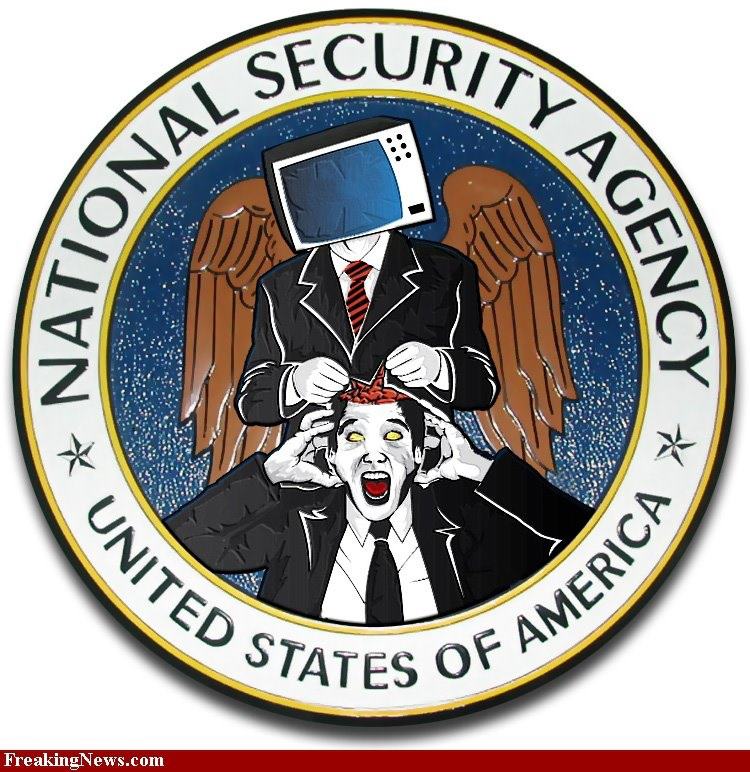

 The
The 
